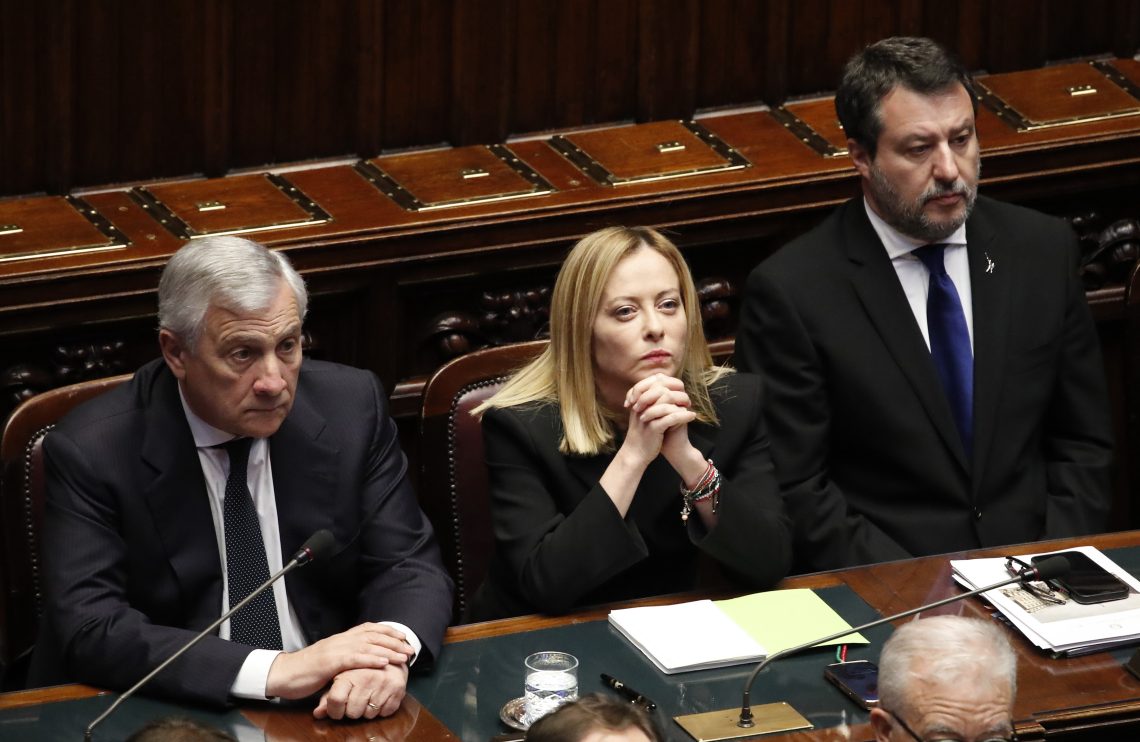Meloni’s coalition balancing fragile alliances and reform risks
Italy’s prime minister enjoys stable leadership but faces mounting political challenges.

In a nutshell
- Coalition stability depends on reform progress despite fiscal prudence
- Internal rivalries and electoral law debates risk eroding right-wing unity
- The opposition could gain if the coalition ignores voters’ wishes
- For comprehensive insights, tune into our AI-powered podcast here
Giorgia Meloni’s government appears to be the most stable in Europe today. The prime minister represents a coalition of parties that have partnered since the 1990s, her popularity ratings are solid and she has crafted an international reputation for herself as a serious and dependable leader. The greatest asset Prime Minister Meloni appears to have is her opposition: The three major parties on the left (the Democratic Party, the Five Star Movement, and the Greens and Left Alliance) would be a tough sell with moderate, centrist voters. Their platform − interwoven with endorsements of extreme left positions, from “wokism” to labor policies − puts off most voters, despite their niche of aficionados.
But as little is certain in politics, Ms. Meloni’s fate is not either.
Prime Minister Meloni’s coalition is formed by three entities: her party, the Brothers of Italy – which won more than 25 percent of the votes in the last election and, according to recent opinion polls, now commands 30 percent of the electorate; the League – a movement born in the agitation for federalism and increased power to the northern part of the country, which under the leadership of Matteo Salvini evolved into an anti-immigration party, not unlike the erstwhile National Front; and Forza Italia – the party founded by Silvio Berlusconi. Her government also has a smattering of smaller “mom and pop” parties.
Both the League and Forza Italia have, at different times, been the controlling shareholder of the right-of-center bloc, but their popularity has waned. Each now garners less than 10 percent of the electorate. There are differences between the two, such as that Mr. Salvini’s fall has been rather abrupt, whereas Forza Italia can consider keeping the support of one-tenth of Italian voters, even after the demise of the charismatic Berlusconi, an impressive success.
Public appreciation for Mr. Salvini, who is now Ms. Meloni’s deputy prime minister, has been steadily declining, though he recently appointed two lieutenants, former army General Roberto Vannacci and Silvia Sardoni, a member of the European Parliament, who together may bring some energy to the League. Meanwhile, Forza Italia now wins votes among those who vote right but do not want to cast their preference for the current prime minister. It has proved a good refuge for relatively moderate and classical liberal voters.
These parties share a long history together and, more decisively, they do not simply govern jointly in the national coalition in Rome, but they partner all through Italy at the municipal and regional levels as well.
What unites Meloni’s coalition
Since coming to power, Ms. Meloni has chosen a path of prudence in public finance, with a minister of the economy, Giancarlo Giorgetti, who, in practice, has broken with the previous anti-austerity rhetoric of his own party (the League). In 2024, the Italian public budget under his stewardship resulted in a fiscal surplus (+0.4 percent), the first in years, signaling a frugal ministry averse to deficit spending in the coming years.
Prime Minister Meloni’s government deserves to be commended for that and, contrary to the perennial cries of spending fanatics, there is no sign that such a prudent steering of the economy is negatively affecting the country’s growth rate. Nevertheless, Italy continues to suffer from pervasive overregulation, which is stifling free enterprise. While Prime Minister Meloni promised “not to bother those who want to do things,” she did very little, if anything, to unleash their potential. The coalition has actually chosen to limit its intervention on public policy issues, focusing instead on larger, framework reforms.
Italy continues to suffer from pervasive overregulation, which is stifling free enterprise.
In particular, Ms. Meloni has pursued three goals: a reform of the justice system to make the judiciary more accountable; a form of “autonomy” that aims to meet the long-standing demand for more power to local governments, particularly in the regions of the north; and the direct election of the prime minister by the electorate, instead of by parliament with a confidence vote as it is now.
The three reform goals fit well with the history of the coalition partners: The first has long been supported by Berlusconi’s Forza Italia, the second is the historical raison d’etre of the League (whose moniker was originally the Northern League, before Mr. Salvini took it over), the third fits with the ambition the Brothers of Italy (and its historical predecessors, the National Alliance and the Italian Social Movement) to evolve the country into a presidential system.
In a way, Prime Minister Meloni has presented her government as one that can achieve the dreams the Italian right has held for over 20 years. But is she likely to succeed? The justice reform is moving, but with many difficulties. The other two endeavors are intertwined, in spite of their very different natures.
The “autonomy” reform builds on an existing constitutional provision. It will not establish federalism in a standard sense, but rather a system in which different regions can bargain with the central government to eke out a number of special powers and jurisdictions. It represents a pragmatic turn from the League, which is trying to work within the existing constitutional framework. An initial law applying the provision is under revision, as the Constitutional Court in a recent decision has severely reduced its scope. Such amputation, however, allowed the government to avoid a referendum on the law, which would have sharply divided Italy between north and south, possibly increasing the coalition’s fragility (this was precisely the bet of those who proposed the referendum).
Prime Minister Meloni moved the typical bargaining between parties to the level of wide-ranging, constitutional or quasi-constitutional reform.
But the problem of the autonomy reform is more political. The very word “autonomy” sits badly with the Brothers of Italy, whose rhetoric has remained consistently nationalistic since its founding in 2012. In a way, the Brothers of Italy’s ruling elite can swallow autonomy, provided it gets a stronger head of the government in exchange. Ms. Meloni’s desired reform of the prime minister being elected directly by the voters is lagging behind. Prime Minister Meloni knows that if it passes, it will be challenged by a popular referendum, which happens in Italy to constitutional reforms that are not approved by a two-thirds majority in parliament.
In a referendum, it is easier to mobilize nay-sayers than supporters; hence, the prime minister seems to be postponing a referendum for as long as possible, implying that a vote on the reform is unlikely until the very end of the parliamentary term in late 2027. But, if her direct election reform goes together with the autonomy reform, this would mean that the latter will be delayed as well. The League, whose consensus is currently faltering (to the benefit of the Brothers of Italy), may not be happy with that.
In short, Prime Minister Meloni moved the typical bargaining between parties to the level of wide-ranging, constitutional or quasi-constitutional reform. This helped reduce short-term conflict but it may backfire in the longer run.
What threatens the Meloni coalition
The governing coalition’s own stability could waver in the next few months as tensions between the partners go beyond their common agenda. As is frequently the case in politics, your true enemy is your neighbor. The dynamics of the Italian electoral system force the League, Forza Italia and the Brothers of Italy to cooperate, yet they all are targeting the same demographic: the right-of-center electorate. If one party’s share gets bigger, as Prime Minister Meloni’s did in the last election, it is likely to come at the expense of its coalition partners and not the opposition. This is particularly true in the current, highly polarized political environment, in which it is unlikely that voters jump to the right from the left and vice versa.
The only party on the right that could appeal to left-of-center moderates, interested in issues such as civil rights and gay marriage, is Forza Italia. But it is a party tainted by the original sin of having been founded by the divisive Berlusconi, which makes it an improbable choice for those who typically vote for the left.

This competition within coalition parties is particularly apparent at the local government level. The Brothers of Italy are clearly dominant in Rome, selecting both the prime minister (Giorgia Meloni) and the president of the Senate (Ignazio La Russa). The northern regions (Piedmont, Lombardy and Veneto) − that is, the richest parts of the country – have presidents who come from the League. But in all these regions, the League is no longer the dominant party at the ballot box and has been overtaken by the Brothers of Italy.
All these serving presidents are in their second mandate, and due to term limits, Italian law does not permit a third. To maintain its local strongholds, the League has been challenging this rule. There is a special case in South Tyrol, which is – since the early history of the Italian Republic – a special statute region (to placate the German-speaking minority). The special statute region should be at liberty to determine its own procedures when it comes to renewing its leadership and the current president, Maurizio Fugatti, from the League, has accordingly tried to make it possible to run a third time.
Prime Minister Meloni has reacted forcefully against that, bringing the government to challenge the claim. While Mr. Fugatti may be able to prevail legally, as opposed to his colleagues from other regions, such a move may upset Ms. Meloni’s hunger for power in the north. Will she be able to achieve it, without impairing her relationship with an indispensable coalition partner such as the League?
That is hard to say. Some commentators bet that Ms. Meloni’s response to these challenges will be to change the electoral law. Italy now runs on a strange electoral system. For both chambers, 37 percent of the seats are allocated by a single-round, first-past-the-post system in as many uninominal constituencies; 61 percent of the seats are distributed proportionally among coalitions and individual lists that have passed the required national vote thresholds; and 2 percent of the seats (eight deputies and four senators) are allocated to the vote of Italians living abroad, likewise in a proportional fashion.
Read more on Italy
- Italy’s experiment: The Mattei Plan for Africa
- Meloni’s African engagement strategy at risk in Libya
- The evolution of Giorgia Meloni, from opposition to government
This system delivered a spectacular victory for Ms. Meloni in 2022 and, though not particularly transparent, appears well suited for a coalition such as on the right, which can win a substantial number of uninominal seats and be proportionally the biggest one at the same time.
Some observers in Rome suggest that Prime Minister Meloni wants to move to a purely proportional electoral system, corrected by a robust majority premium for the coalition winning the most votes. This presents a risk. Such a majority premium would be accepted only if it is high enough not to cause an outcry from the other parties who perceive a minority coalition seeking absolute power. But the higher the threshold, the more difficult it will be to reach. Plus, if Ms. Meloni’s idea is really to have the voters elect the prime minister by writing a name down on their ballot, this contrasts with a proportional representation system, which aims to create governments through post-election parliamentary negotiations.
Some maintain that Prime Minister Meloni dreams of a system in which she could pick her allies after the elections, having made the Brothers of Italy more of a centrist party. It is unlikely that she could be so naive. Her reputation and, more importantly, the sentiments of her voters, are both firmly on the right – no matter how warm her relationship with Ursula von der Leyen may be or how much Ms. Meloni cooperated with former United States President Joe Biden and supported him on Ukraine. Her party was built as a reaction against grand coalitions and cannot be the center of a new one.
Scenarios
History is not necessarily a good teacher, but it tells us that Italian governments have routinely changed their electoral goals over the past 20 years – hoping to find ones perfectly suited to their needs, only to find that such ambitions were always crushed by reality. History also tells us that since 1996, Italians have voted against the incumbent parties in government, switching left to right at any election.
Likely: Meloni wins a second term by 2027 if the left underperforms
If she achieves a second term, Prime Minister Meloni will indeed be making history – even more than she already has, having become the country’s first female prime minister. This is a probable scenario because the left is in shambles. But the left parties, no matter how fractured, weak and woke, will certainly unite during the next elections, and that may be enough to make them a powerful contestant, no matter how incoherent.
On the left, Giuseppe Conte, the leader of the Five Star Movement, is a rare case of a former Italian prime minister who continues to be popular among various constituencies and could be a threat to Ms. Meloni, if the leftist coalition decides to pick him as their prime ministerial candidate.
Possible: Voters choose the left if the coalition ignores local issues
More importantly, Prime Minister Meloni could be in a much weaker position in two years’ time because her coalition might prove to be less solid than it looks. Cracks are already showing, and so is the potential for further conflicts. Ms. Meloni enjoys a strong international reputation now, but people tend not to vote on foreign policy, and Italy is no exception. Her government has bet everything on bold institutional reforms and has done nothing on the level of supply-side, growth-fostering changes. Its biggest virtue has been to keep public finance relatively sound. But it is unclear whether this is a virtue voters appreciate, in Italy or elsewhere.
Contact us today for tailored geopolitical insights and industry-specific advisory services.









